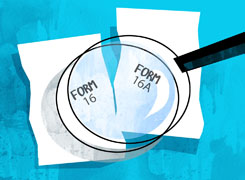Confused about Taxable Income? Yash from Vapi Needs Advice
T S Khurana |538 Answers |Ask -Follow
Tax Expert - Answered on Jan 22, 2025
Since the last 21 years, he has also been providing expert advice on financial matters, including investments and diversification of funds, and wealth building in the long term to his clients.
He believes that investment in real estate is the safest way for better returns and wealth generation over a period of time.
A former chairman of the Chandigarh Chapter of Institute of Cost Accountants of India, T S Khurana has also served as member of its technical committee.... more
Hello sir, Im yash from Vapi. My company has netprofit of 10cr and loss of 4 cr. Suggest me how much amount is taxable
When your company is earning Net Profit of Rs.10.00 Cr, how it could incur loss at the same time.
Kindly ask question with full details.
Most welcome for any further clarifications. Thanks
You may like to see similar questions and answers below
Samkit Maniar | Answer |Ask -Follow
Tax Expert - Answered on Jul 12, 2024
T S Khurana |538 Answers |Ask -Follow
Tax Expert - Answered on Aug 04, 2024
T S Khurana |538 Answers |Ask -Follow
Tax Expert - Answered on Dec 06, 2024
Samraat Jadhav |2522 Answers |Ask -Follow
Stock Market Expert - Answered on Dec 23, 2025
Samraat Jadhav |2522 Answers |Ask -Follow
Stock Market Expert - Answered on Dec 23, 2025
Samraat Jadhav |2522 Answers |Ask -Follow
Stock Market Expert - Answered on Dec 23, 2025
Samraat Jadhav |2522 Answers |Ask -Follow
Stock Market Expert - Answered on Dec 23, 2025
Samraat Jadhav |2522 Answers |Ask -Follow
Stock Market Expert - Answered on Dec 23, 2025
Dr Nagarajan J S K |2578 Answers |Ask -Follow
NEET, Medical, Pharmacy Careers - Answered on Dec 23, 2025
Samraat Jadhav |2522 Answers |Ask -Follow
Stock Market Expert - Answered on Dec 23, 2025
Ramalingam Kalirajan |10924 Answers |Ask -Follow
Mutual Funds, Financial Planning Expert - Answered on Dec 23, 2025
Radheshyam Zanwar |6753 Answers |Ask -Follow
MHT-CET, IIT-JEE, NEET-UG Expert - Answered on Dec 23, 2025

Suggestion - (1) Better to take regular BPT admission (1st year) only in a recognized university. (2) Or choose a different safe course instead of risky lateral entry. (It is more recommended)
The final choice/decision will be yours.
Good luck.
Follow me if you receive this reply.
Radheshyam
Pl follow and like if you are satisfied with the reply.
Ravi Mittal |679 Answers |Ask -Follow
Dating, Relationships Expert - Answered on Dec 22, 2025




























